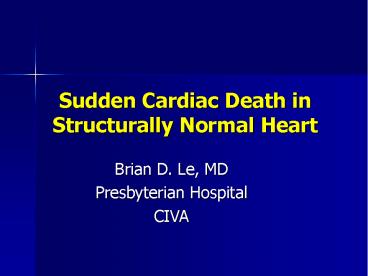Sudden Cardiac Death in Structurally Normal Heart PowerPoint PPT Presentation
Title: Sudden Cardiac Death in Structurally Normal Heart
1
Sudden Cardiac Death in Structurally Normal Heart
- Brian D. Le, MD
- Presbyterian Hospital
- CIVA
2
Presentation
- HPI-35 yo WM s PMH presents with exertional
syncope - h/o PAF since 18 yrs of age
- Holter- monomorphic isolated PVCs
- Echo- structurally normal heart
- Meds- no OTC or herbal
- Social- occ. Etoh, no IVDA
- Family History
- Sister (31) - dizziness and palpitations
- Sisters son (6) - cardiac arrest at 8 mo old
after a loud noise with successful DCCV
Gaita et al. Circulation. 2003 108
3
- A- 35 yo WM c syncope
- B- 31 yo sister, dizziness and palpitations
- C- 6 yo son, SCD
4
Sudden Cardiac Death
- Unexpected death from cardiac cause within a
short time (1 hour of sx) in a person without
prior conditions that would appear fatal. - 300-400,000 deaths annually (U.S.).
- VT/VF account for 80.
- 20 have structurally normal hearts.
Wever E, et al. JACC. Vol 43, 2004.
5
Sudden Cardiac Death
- Normal hearts, lt 40 years old
- lt 30 successful resuscitation reaching hospital
- Risk of life-threatening events in cardiac arrest
survivors is 25-40 at two years
Wever E, et al. JACC. Vol 43, 2004.
6
Primary Electrophysiologic Abnormalities
- WPW anterograde BPT ERP lt250ms.
- Brugada RBBB w/ST elevation V1-V3
- Catecholamine Polymorphic VT hRyR2.
- Long QT QTc (gt440ms), TdP w/long coupled PVC
(600-800ms). - Short-coupled TdP normal QTc, PVC w/short
coupling (200-300ms). - Short QT syndrome
- Idiopathic VF
7
Brugadas
8
Catecholaminergic Polymorphic VT
9
Idiopathic VF
10
- A- 35 yo WM c syncope
- B- 31 yo sister, dizziness and palpitations
- C- 6 yo son, SCD
11
Evaluation
- Physical Exam
- Serial ECGs
- Holter
- Heart rate variability
- QT dispersion
- Signal-averaged ECG
- Echocardiogram
- Cardiac MRI
- Electrophysiological Study
12
QT Interval
- Represents ventricular repolarization.
- Normal QTc upper limit 440ms.
- Bazetts formula QTc QT/ RR
- Rautaharju formula (14,379 pts)
- QTp (ms) 656/ (1HR/100)
- QT/QTp x 100 QTpredicted.
- 88 of QTp 2 SD below mean
- Lower limit of nl QT int. 88 of QTp
13
QT Interval and SCD
- Algra et al. Br.Ht.J. 19937043-8.
- Nested cohort 6693 consecutive pts w/24 ECG.
- F/U 2.5 years in 99.5 of pts.
- End point QTc correlation w/SCD (104 pts).
- Results
- QTc gt 440ms ? 2.3 RR of SCD.
- QTc lt 400ms ? 2.4 RR of SCD.
14
Familial Short QT
- Gussak et al. Cardiology 20009499-102.
- 3 members of one family age 17-51 yo.
- Palpitations, sx PAF, syncope?SCD
- All w/ structurally normal hearts.
- All w/ S-QT (260-280ms) QT interval lt80
predicted by Rautaharju method.
15
Factors That Shorten QT
- Increase in heart rate
- Hyperthermia
- Hypercalcemia
- Hyperkalemia
- Acidosis
- Changes in autonomic tone
16
Genetic Basis of Short QT
- Brugada, Antzelevitch, et al. Circ.
200410930-5. - Different missense mutations in same residue
codon 588 of KCNH2 (HERG IKr). - Mutations only seen in sQT, and not in normal
relatives. - Patch clamp models
17
Heterogeneity of Short QT
- Genetic Studies- KCNQ1 gene mutation G for C,
subs. valine for leucine (IKs) - Mutations negative in 200 unrelated controlled
individuals - Loss of function leads?LQT1
Bellocq et al. Circulation. 109 2004
18
- KCNJ2, encoding for inwardly rectifying K channel
Kir2.1 - Rapid repolarization
- SQT3
- Loss of function results in LQT7 (Andersons
disease)
Priori et al. Circ. Res. 2005 96
19
Ion Channel Mutations
- Loss of Function
- SCN5A ? Brugada
- IKs ? LQT1
- IKr ? LQT2
- Gain of Function
- SCN5A ? LQT3
- IKs ? Fam. A. Fib., Short QT
- IKr ? Short QT
20
Short QT Syndrome Rx
- Gaita et al. JACC. 2004431494-9.
- 6 pts. from 2 different families.
- Drugs Flecainide (IV or oral), Sotalol,
Ibutilide, and Hydroquinidine.
21
Short QT Rx Results
- Flecainide slight inc. QT due to QRS
prolongation. - Ibutilide Sotalol no change in QT
- Hydroquinidine
- 5/6 pts- QTc normalized (290?405ms)
- EPS 5/5 pts- inc. VERP, no VF/VT
- F/U 11 mos- 4/6 on hydroquinidine w/o sx or
arrhythmias detected by ICD.
22
Ventricular ERP
23
(No Transcript)
24
Quinidine
- VW Class Ia (sodium channel blocker)
- Blocks INa, IKr, IKs, Ito, L-type Ca2,
IK1(in.rect.), IKATP ? QT increase. - Adverse effects diarrhea, SLE, thrombocytopenia,
hepatitis, cinchonism (tinnitus/HA), TdP, many
drug interactions 2/2 block of CYP2D6.
25
ICD
- First line therapy
- Risk of inappropriate shock delivery- Tw
oversensing (Schimpf et al. JCE. 14 Dec 2003)
26
- Ventricular ERP- lt150ms - induction of VF -
Atrial ERP- 120ms
Circulation. 2003 108
27
Family Tree
49 yo
39 yo
39 yo
8 mo
Circulation. 2003 108
28
Schimpf, et al. Heart Rhythm. 20042
29
SummaryShort QT Syndrome
- Significantly short QTc lt 300ms.
- Tall peaked T-waves.
- Clinical palpitations, syncope, SCD.
- Significant FHX of SCD.
- Atrial and ventricular arrhythmias.
- Structurally normal hearts.
- Treatment ICD and/or Quinidine.

